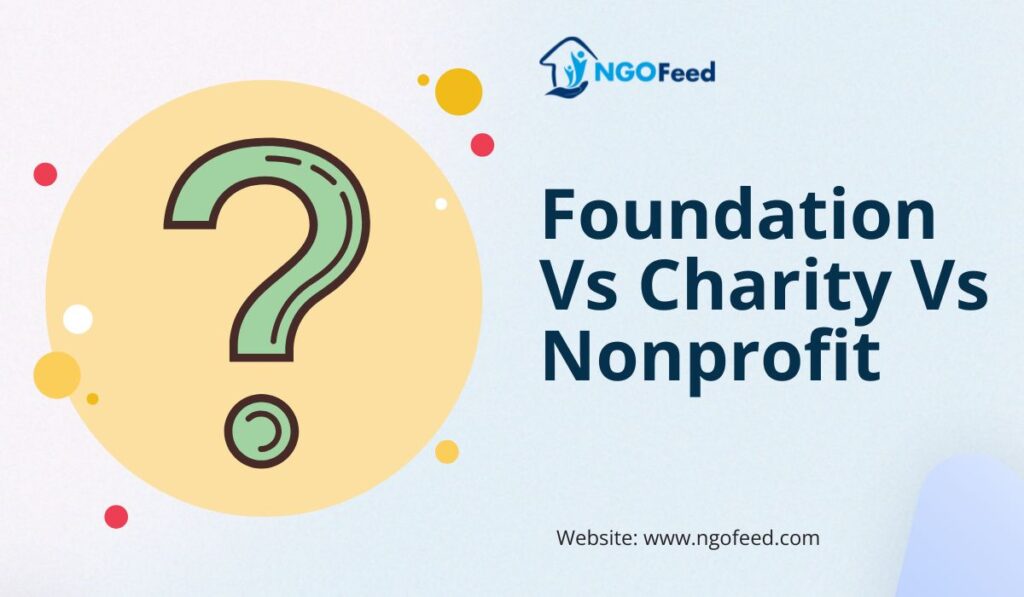Foundation Vs Charity Vs Nonprofit: In the world of giving and social impact, words like “foundation,” “charity,” and “nonprofit” are used interchangeably, but they actually refer to distinct entities with different purposes, structures, and roles. For those looking to support a cause, start their own initiative, or simply navigate the landscape of philanthropy more effectively, it is essential to understand these differences. This article goes into the essential differences between foundations, charities, and nonprofits to help you understand their core missions, how they work, and the impact they make in society. Whether you are a donor, volunteer, or simply passionate about making a difference, this guide will empower you with the knowledge to meaningfully engage with the right organization.
Table of Contents
What is a Foundation?
A foundation is a nonprofit corporation or a charitable trust that makes grants to organizations, institutions, or individuals for charitable purposes such as science, education, culture, and religion. Foundations are crucial in addressing societal issues and supporting various causes, from education and health to the arts and environmental conservation.
There are two foundation types: private foundations and grantmaking public charities.
- A private foundation’s money comes from a family, an individual, or a corporation. Private foundations must meet a “payout requirement,” meaning they have to give away a certain amount of their assets every year.
- A grantmaking public charity (sometimes called a “public foundation”) gets its money from many different sources, such as foundations, individuals, and government agencies.
What is Charity?
Charity is to give to others that which belongs to you. When you give to charity, you experience happiness. Do you know why? Because when you let go of something that you love, you give happiness to others. For most people that one thing is money. Even if you have the slightest thought of taking away something from others, you yourself create various obstructions and difficulties in your life.
Spiritual Science places more importance on the inner intent (cause) than on the action (effect) of giving to charity. Charity done with the unity of the mind, speech and conduct receives tremendous benefits. The one who donates willingly and happily reap more benefits than the one who donates under pressure or with the expectation of return. Your intention should be to lessen the other person’s misery, not to gain fame or fortune.
Also Read: How to apply for CSR Funding in India?
What is a Nonprofit Organisation?
A nonprofit organization is an entity that is created and operated for charitable or socially beneficial purposes rather than to make a profit. A nonprofit might serve religious, scientific, charitable, educational, literary, health, or animal welfare purposes.
In the U.S., nonprofit organizations are granted tax-exempt status. Donations made to a nonprofit organization are typically tax-deductible and the nonprofit itself pays no tax on donations or on money earned through other fundraising activities.
Nonprofit organizations are sometimes called NPOs or 501 c 3 organisations based on the section of the Internal Revenue Service (IRS) tax code that permits them to operate.
Foundation Vs Charity Vs Nonprofit – Difference
Source of Funds
- Foundation: Funded by a single, large endowment.
- Charity: Funded by continual donations and grants. Must receive at least one-third of its contributions from the general public or meet the 10% facts and circumstances test.
- NGO: Funded by continual donations, fundraising initiatives, and grants.
Grants
Another difference between foundations, charities and nonprofits is their relationship with grants. Foundations, particularly private ones, distribute grants to other charitable organizations to help benefit the public. Both charities and nonprofits can receive grants from foundations and other corporations. Occasionally, a charity may distribute a grant to further its purpose.
Tax Rules
- Foundation: Meets 501(c)(3) status if mission serves: “charitable, religious, educational, scientific, literary, testing for public safety, fostering national or international amateur sports competition, and preventing cruelty to children or animals.
- Charity: Meets 501(c)(3) status if mission serves: “charitable, religious, educational, scientific, literary, testing for public safety, fostering national or international amateur sports competition, and preventing cruelty to children or animals.”
- NGO: Meets 501(c)(3) status if mission serves: “charitable, religious, educational, scientific, literary, testing for public safety, fostering national or international amateur sports competition, and preventing cruelty to children or animals.”
Also Read: CSR Grants for NGOs
Activities
- Foundation: Supports any of the following types of organizations: charitable, religious, educational, scientific, literary, testing for public safety, fostering national or international amateur sports competition, and preventing cruelty to children or animals.
- Charity: Supports any of the following types of organizations: charitable, religious, educational, scientific, literary, testing for public safety, fostering national or international amateur sports competition, and preventing cruelty to children or animals.
- NGO: Supports any of the following types of organizations: charitable, religious, educational, scientific, literary, testing for public safety, fostering national or international amateur sports competition, and preventing cruelty to children or animals.
More Bifurcations – Private Foundation
A private foundation is defined as a nonprofit charitable entity that is created by any single benefactor (usually an individual or a business). The benefactor makes an investment using an initial seed donation which is then also dispersed by way of grants to other individuals or charities according to the charitable purpose of the foundation.
The endowment structure of any private foundation also provides a stable, consistent and reliable source for continuing the funds, which is very important as the budgeting as well as funding decisions of an organisation is also made with a greater amount of confidence. This also has an effect towards ensuring timely as well as efficient access to the grant which the foundation seeks to provide for charitable purposes.
One of the main benefits of operating the foundation comes from the actual degree of control that is available with the institution. The person who is responsible for running the foundation has the power to decide on the investment decisions and the charitable causes that they can support. The board of directors of the organisation can comprise entirely of members from a single-family as well. One of the main drawbacks of a private foundation is its operational independence, as their private funding can give them the luxury to ignore public opinion. Also, they may be able to generate a less than optimal outcome if they focus their efforts on areas that will not result in much financial gains.
Also Read: Reasons to Donate to Charity
Public Charity
Public charity refers to solicitation of the periodic donations that they receive from a community. It has to at least receive one-third of the total contributions through the general public, and it uses these funds to support the initiatives like providing medical care, operating a homeless shelter or other such charitable purposes.
Many people consider public charities desirable compared to private foundations as they appeal to the public sentiment. They also have a very important role to play in our society as they help the individual contributions get channelled towards a charitable purpose that ultimately serves all the members present in the community.
There are a number of public charities that operate all around the world, and they help provide the necessary funding to take care of a number of important issues and causes that help the poor and the underprivileged sections of our society.
Conclusion
There are a variety of entities created to help advance social causes and benefit the public. Foundations, charities and nonprofits all help provide revenue to support charitable activities.
Learning about how these three types of organizations operate can help you when choosing one to donate to through your company or with your own funds.









